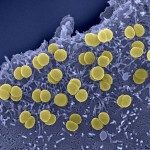Link to Pubmed [PMID] – 27655040
Link to DOI – 10.1371/journal.pone.0162434
PLoS One ; 11(9): e0162434
Neisseria meningitidis is an exclusively human pathogen frequently carried asymptomatically in the nasopharynx but it can also provoke invasive infections such as meningitis and septicemia. N. meningitidis uses a limited range of carbon sources during infection, such as glucose, that is usually transported into bacteria via the phosphoenolpyruvate (PEP):sugar phosphotransferase system (PTS), in which the phosphocarrier protein HPr (encoded by the ptsH gene) plays a central role. Although N. meningitidis possesses an incomplete PTS, HPr was found to be required for its virulence. We explored the role of HPr using bioluminescent wild-type and ΔptsH strains in experimental infection in transgenic mice expressing the human transferrin. The wild-type MC58 strain was recovered at higher levels from the peritoneal cavity and particularly from blood compared to the ΔptsH strain. The ΔptsH strain provoked lower levels of septicemia in mice and was more susceptible to complement-mediated killing than the wild-type strain. We tested whether meningococcal structures impacted complement resistance and observed that only the capsule level was decreased in the ΔptsH mutant. We therefore compared the transcriptomic profiles of wild-type and ΔptsH strains and identified 49 differentially expressed genes. The HPr regulon contains mainly hypothetical proteins (43%) and several membrane-associated proteins that could play a role during host interaction. Some other genes of the HPr regulon are involved in stress response. Indeed, the ΔptsH strain showed increased susceptibility to environmental stress conditions. Our data suggest that HPr plays a pleiotropic role in host-bacteria interactions most likely through the innate immune response that may be responsible for the enhanced clearance of the ΔptsH strain from blood.

